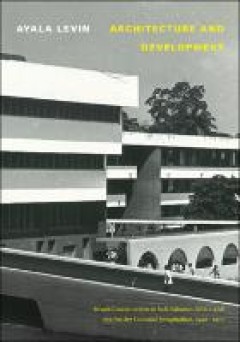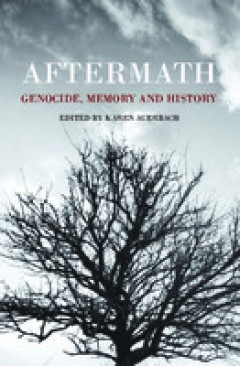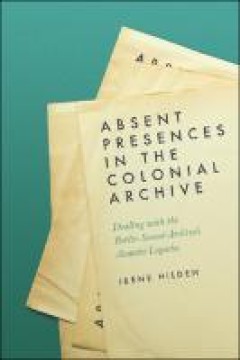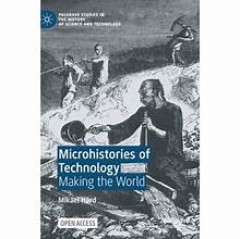Filter by

Architecture and Development
Ayala Levin charts the settler colonial imagination and practices that undergirded Israeli architectural development aid in Africa.
- Edition
- -
- ISBN/ISSN
- 9781478091820
- Collation
- oer.unej.ac.id
- Series Title
- -
- Call Number
- -

Aftermath
Aftermath: Genocide, Memory and History examines how genocide is remembered and represented in both popular and scholarly memory, integrating scholarship on the Holocaust with the study of other genocides through a comparative framework. Scholars from a range of disciplines re-evaluate narratives of past conflict to explore how memory of genocide is mobilised in the aftermath, tracing the devel…
- Edition
- -
- ISBN/ISSN
- -
- Collation
- -
- Series Title
- History
- Call Number
- -

Absent Presences in the Colonial Archive
The colonial past through objects of sound The Berlin Sound Archive (Lautarchiv) consists of an extensive collection of sound recordings, compiled for scientific purposes in the first half of the 20th century. Recorded on shellac are stories and songs, personal testimonies and poems, glossaries and numbers. This book engages with the archive by consistently focusing on recordings produced under…
- Edition
- -
- ISBN/ISSN
- 9789462702189
- Collation
- oer.unej.ac.id
- Series Title
- -
- Call Number
- Colonialism and imperialism

The Ndebele, Frank Oates, and Knowledge Production in the 1870s = Encounters …
This open access book addresses a question fundamental to the histories of empire and Africa: at the point of the colonial encounter, how was knowledge made? How did different communities, with little or no prior contact, construct meaning about one another? Amidst huge changes in the politics and economics of a continent, on the cusp of almost complete colonization at the hands of European pow…
- Edition
- -
- ISBN/ISSN
- 9783031759635
- Collation
- IX, 125 hlm; ill., lamp.,
- Series Title
- -
- Call Number
- -

Points of Entanglement in French Caribbean Travel Writing (1620-1722)
This open-access book investigates Francophone Caribbean literature by exploring and analyzing French seventeenth-century travel writings. The book argues for a literary re-examination of the representation of the early colonial Caribbean by proposing theoretical linkages to contemporary Caribbean theories of creolization and archipelagic thinking. Using Édouard Glissant’s notion of points o…
- Edition
- 1
- ISBN/ISSN
- 978-3-031-23356-2
- Collation
- oer.unej.ac.id
- Series Title
- Early Modern Cultural Studies 1500–1700
- Call Number
- 379

Mining Gold and Manufacturing Ignorance
This open access book charts how South Africa’s gold mines have systematically suppressed evidence of hazardous work practices and the risks associated with mining. For most of the twentieth century, South Africa was the world’s largest producer of gold. Although the country enjoyed a reputation for leading the world in occupational health legislation, the mining companies developed a syste…
- Edition
- 1
- ISBN/ISSN
- 978-981-19-8327-6
- Collation
- XIII, 459
- Series Title
- -
- Call Number
- -

Microhistories of Technology
In this open access book, Mikael Hård tells a story of how people around the world challenged the production techniques and products brought by globalization. Retaining their autonomy and freedom, creative individuals selectively adopted or rejected modern gadgets, tools, and machines. In standard historical narratives, globalization is portrayed as an unstoppable force that flattens all obsta…
- Edition
- 1
- ISBN/ISSN
- 978-3-031-22813-1
- Collation
- -
- Series Title
- Palgrave Studies in the History of Science and Technology
- Call Number
- XX, 290

The Ndebele, Frank Oates, and Knowledge Production in the 1870s
This open access book addresses a question fundamental to the histories of empire and Africa: at the point of the colonial encounter, how was knowledge made? How did different communities, with little or no prior contact, construct meaning about one another? Amidst huge changes in the politics and economics of a continent, on the cusp of almost complete colonization at the hands of European pow…
- Edition
- 1
- ISBN/ISSN
- 978-3-031-75964-2
- Collation
- -
- Series Title
- Cambridge Imperial and Post-Colonial Studies
- Call Number
- IX, 125

Medical Missionaries and Colonial Knowledge in West Africa and Europe, 1885-1914
This open access book offers an entangled history of hygiene by showing how knowledge of purity, health and cleanliness was shaped by evangelical medical missionaries and their encounters with people in West Africa. By tracing the interactions and negotiations of six Basel Mission doctors, who practised on the Gold Coast and in Cameroon from 1885 to 1914, the author demonstrates how notions of …
- Edition
- 1
- ISBN/ISSN
- 978-3-031-27130-4
- Collation
- -
- Series Title
- Cambridge Imperial and Post-Colonial Studies
- Call Number
- XVIII, 454

Medical Missionaries and Colonial Knowledge in West Africa and Europe, 1885-1914
This open access book offers an entangled history of hygiene by showing how knowledge of purity, health and cleanliness was shaped by evangelical medical missionaries and their encounters with people in West Africa. By tracing the interactions and negotiations of six Basel Mission doctors, who practised on the Gold Coast and in Cameroon from 1885 to 1914, the author demonstrates how notions of …
- Edition
- -
- ISBN/ISSN
- 978-3-031-27128-1
- Collation
- XVIII, 454
- Series Title
- -
- Call Number
- -
 Computer Science, Information & General Works
Computer Science, Information & General Works  Philosophy & Psychology
Philosophy & Psychology  Religion
Religion  Social Sciences
Social Sciences  Language
Language  Pure Science
Pure Science  Applied Sciences
Applied Sciences  Art & Recreation
Art & Recreation  Literature
Literature  History & Geography
History & Geography